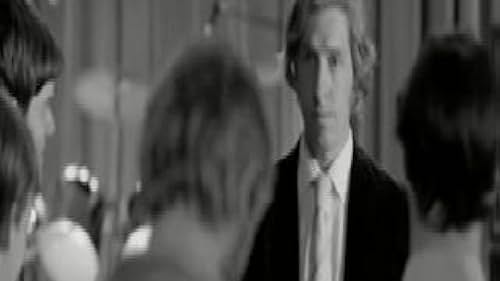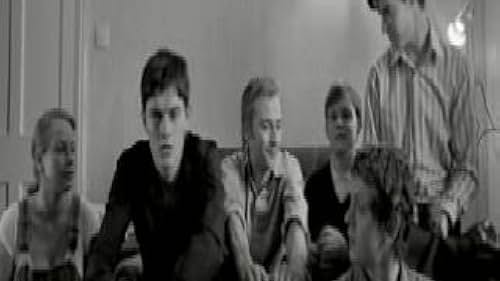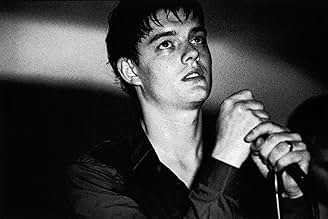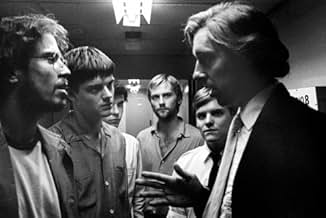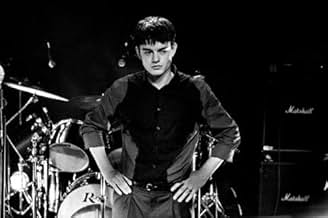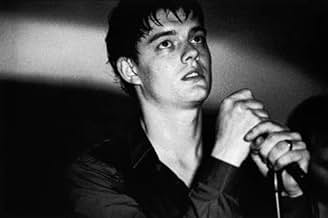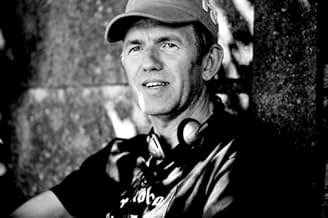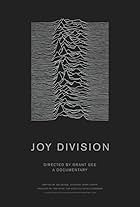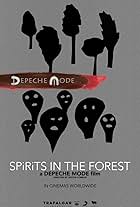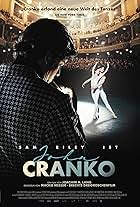A profile of Ian Curtis, the enigmatic singer of Joy Division whose personal, professional, and romantic troubles led him to die by suicide at the age of 23.A profile of Ian Curtis, the enigmatic singer of Joy Division whose personal, professional, and romantic troubles led him to die by suicide at the age of 23.A profile of Ian Curtis, the enigmatic singer of Joy Division whose personal, professional, and romantic troubles led him to die by suicide at the age of 23.
- Director
- Writers
- Stars
- Won 1 BAFTA Award
- 31 wins & 35 nominations total
Martha Myers Lowe
- Ian's Sister
- (as Martha Myers-Lowe)
Mary Jo Randle
- Debbie's Mother
- (as Mary-Jo Randle)
- Director
- Writers
- All cast & crew
- Production, box office & more at IMDbPro
Featured reviews
The first thing that strikes you about 'Control' is its silence, and the chilly beauty of its black and white images. As a still photographer first-time director Anton Corbijn photographed Joy Division in black and white during their short existence. He knows how to get the remorselessly grim feel of the north of England in the late Seventies. (The boys came from the outskirts of Manchester. Joy Division formed in 1976.) This film (there's a documentary just coming out on the band too) is loosely based on a memoir of her marriage by Deborah Curtis, lead singer Ian Curtis' young wife, who had a baby girl by him and then tragically found him after he'd hanged himself in 1980, two months short of his twenty-fourth birthday, just as the band was to tour America for the first time.
'Control's' strength is a certain recessiveness. In the English style, it's offhand and avoids huge dramatic crescendos. That's refreshing. And besides the images and the restraint, the film is worth seeing for the concert sequences. The cast actually plays the Joy Division music live, and Sam Riley, who plays Ian Curtis, not only closely resembles him, but is a riveting and intense, almost at times scary, performer. When he says the public doesn't know how much of himself he puts into his performances, we know what he means.
The film is excellent at showing Ian's dilemmas. The band is a sudden success. He has an attack in their car as the band returns from a gig. Doctors tell him he has a form of epilepsy. He's given a fistful of pills to take every day and told to have early nights and stay off the booze. How faithfully he takes the pills is unclear but he suffers from their side effects in various ways, while late nights and booze are essentials of his existence. It doesn't seem that the English doctors knew very well how to treat him, and he was so busy performing he didn't take the time to go to specialists and have more extensive tests.
Ian had gotten married to Deborah (Samantha Morton) early--too early. On the road he meets a Belgian part-time journalist, Annik Honoré (Alexandra Maria Lara), and they fall uneasily in love. He's not strong enough to decide between the two women. Fear that his disease will only get worse hounds him, and the fits go on. Riley is fascinating to watch as he undergoes an increasingly visible meltdown. Other cast members are cyphers, though Joe Anderson, who has the role of Max in Taymor's Across the Universe, is the lead guitarist. Morton has a drab role but Deborah's unfortunate situation is present as a constant counterpart to Ian's story. The two other important characters are the Manchester music guru Tony Wilson (Craig Parkinson) and the band's wise-guy manager Rob Gretton (Toby Kebbell).
The creative inspiration of the band, the nature of their songs, the cast of their lyrics, the reason why Joy Division is a cult band today when it only existed for four years--these are matters the film is unable to elucidate. Watch it for the cool visuals, for the tall, soulful Sam Riley, and for the terrific live performance scenes. Enjoy the understatement, and the silence. Don't expect more.
Harvey Weinstein has chosen both for Control and for the soon-to-open Todd Haynes Bob Dylan film I'm Not There to have a slowly-unrolling distribution system, and hopes to bestow early cult status on both films by having them premiere at that temple of cinephilia, Film Forum, in lower Manhattan, New York City, and wait for the buzz of the cognoscenti to multiply and spread. It may work. But both films are tough sells. But A.E. Scott of the NYTimes has said Control is "enigmatic and moving, much in the manner of Joy Division's best songs." And that's a good send-off.
'Control's' strength is a certain recessiveness. In the English style, it's offhand and avoids huge dramatic crescendos. That's refreshing. And besides the images and the restraint, the film is worth seeing for the concert sequences. The cast actually plays the Joy Division music live, and Sam Riley, who plays Ian Curtis, not only closely resembles him, but is a riveting and intense, almost at times scary, performer. When he says the public doesn't know how much of himself he puts into his performances, we know what he means.
The film is excellent at showing Ian's dilemmas. The band is a sudden success. He has an attack in their car as the band returns from a gig. Doctors tell him he has a form of epilepsy. He's given a fistful of pills to take every day and told to have early nights and stay off the booze. How faithfully he takes the pills is unclear but he suffers from their side effects in various ways, while late nights and booze are essentials of his existence. It doesn't seem that the English doctors knew very well how to treat him, and he was so busy performing he didn't take the time to go to specialists and have more extensive tests.
Ian had gotten married to Deborah (Samantha Morton) early--too early. On the road he meets a Belgian part-time journalist, Annik Honoré (Alexandra Maria Lara), and they fall uneasily in love. He's not strong enough to decide between the two women. Fear that his disease will only get worse hounds him, and the fits go on. Riley is fascinating to watch as he undergoes an increasingly visible meltdown. Other cast members are cyphers, though Joe Anderson, who has the role of Max in Taymor's Across the Universe, is the lead guitarist. Morton has a drab role but Deborah's unfortunate situation is present as a constant counterpart to Ian's story. The two other important characters are the Manchester music guru Tony Wilson (Craig Parkinson) and the band's wise-guy manager Rob Gretton (Toby Kebbell).
The creative inspiration of the band, the nature of their songs, the cast of their lyrics, the reason why Joy Division is a cult band today when it only existed for four years--these are matters the film is unable to elucidate. Watch it for the cool visuals, for the tall, soulful Sam Riley, and for the terrific live performance scenes. Enjoy the understatement, and the silence. Don't expect more.
Harvey Weinstein has chosen both for Control and for the soon-to-open Todd Haynes Bob Dylan film I'm Not There to have a slowly-unrolling distribution system, and hopes to bestow early cult status on both films by having them premiere at that temple of cinephilia, Film Forum, in lower Manhattan, New York City, and wait for the buzz of the cognoscenti to multiply and spread. It may work. But both films are tough sells. But A.E. Scott of the NYTimes has said Control is "enigmatic and moving, much in the manner of Joy Division's best songs." And that's a good send-off.
8tmk1
I saw this film last night then I went home and read a lot of the comments here. I think some things have been missed between the glowing reviews and the bitter disappointments.
First, it is a truly beautiful film and I found the acting uniformly excellent. That has already been said plenty of times.
More interesting to me are the comments about this not being an accurate or fair portrait of Ian Curtis and those around him. I've read plenty of accounts that characterize Ian and his band-mates as relentless practical jokers -- the book Torn Apart by Mick Middles and Lindsay Reade is full of these anecdotes. But I also think it's naive to expect a film like this to be anything close to a fair and objective telling of anyone's life. This is a dramatic interpretation, not a documentary.
In addition to the multiple meanings the title has for the characters in the film, this film is itself an exercise in CONTROL: Deborah Curtis's control over her husband's legacy; the surviving band members' control over the public image of Joy Division.
No, the film does not show the laughs and good times the band had, but this is in keeping with all of Joy Division's work. Their entire output as a living band was highly stylized. Almost everything they issued was in stark black and white; their imagery was overwhelmingly bleak and funereal; and they certainly courted controversy with their name and imagery. All of which was very consciously and tightly CONTROLLED by the band and the people at Factory. They gave few interviews and preferred to let the work speak for itself.
My point is that this film simply continues that project. It is yet another highly stylized piece of work in the Joy Division canon. To paraphrase the Tony Wilson remark that has been cited elsewhere in these comments -- when you have the choice between the legend and the facts, go with the legend. Their work has always had an epic, legendary quality. This movie is absolutely in keeping with that aesthetic.
I think it's also worth noting that Corbijn was a participant in shaping the Joy Division legacy from the very start -- his photographs of the band helped shape their image and his video for "Atmosphere" set the tone for how their legacy would be preserved. CONTROL is simply another collaboration with the band and their music. An extension of that original project.
I think that ultimately this film is an excellent piece of work. Just as Joy Division produced music of astonishing beauty and resonance out of the misery of life in post-industrial England, this film turns personal pain and loss into a powerful piece of art.
First, it is a truly beautiful film and I found the acting uniformly excellent. That has already been said plenty of times.
More interesting to me are the comments about this not being an accurate or fair portrait of Ian Curtis and those around him. I've read plenty of accounts that characterize Ian and his band-mates as relentless practical jokers -- the book Torn Apart by Mick Middles and Lindsay Reade is full of these anecdotes. But I also think it's naive to expect a film like this to be anything close to a fair and objective telling of anyone's life. This is a dramatic interpretation, not a documentary.
In addition to the multiple meanings the title has for the characters in the film, this film is itself an exercise in CONTROL: Deborah Curtis's control over her husband's legacy; the surviving band members' control over the public image of Joy Division.
No, the film does not show the laughs and good times the band had, but this is in keeping with all of Joy Division's work. Their entire output as a living band was highly stylized. Almost everything they issued was in stark black and white; their imagery was overwhelmingly bleak and funereal; and they certainly courted controversy with their name and imagery. All of which was very consciously and tightly CONTROLLED by the band and the people at Factory. They gave few interviews and preferred to let the work speak for itself.
My point is that this film simply continues that project. It is yet another highly stylized piece of work in the Joy Division canon. To paraphrase the Tony Wilson remark that has been cited elsewhere in these comments -- when you have the choice between the legend and the facts, go with the legend. Their work has always had an epic, legendary quality. This movie is absolutely in keeping with that aesthetic.
I think it's also worth noting that Corbijn was a participant in shaping the Joy Division legacy from the very start -- his photographs of the band helped shape their image and his video for "Atmosphere" set the tone for how their legacy would be preserved. CONTROL is simply another collaboration with the band and their music. An extension of that original project.
I think that ultimately this film is an excellent piece of work. Just as Joy Division produced music of astonishing beauty and resonance out of the misery of life in post-industrial England, this film turns personal pain and loss into a powerful piece of art.
Control, the story of Ian Curtis, singer of British alternative band Joy Division. The film is made in black and white, which adds a certain edge to the film. There isn't much drama or fast-paced scenes (until the very end, I guess), and that seems to be what everyone criticizes about the movie. Why do you think the director wanted it black and white? If it had been a sincerely boring film, why release it?
Of course they made up some aspects of Ian's life, but the fact is that Ian was a dull, depressed human being. He couldn't handle love, or fame overall. He doesn't show signs of emotion in the film, and doesn't speak much at all. Truth is, black and white was exactly what he saw, while he was spiraling towards the end of his life.
The acting is incredible. Absolutely spot on. Very very noteworthy.
I enjoyed Control, but that's only because I love indie films and rock and roll movies. If you're looking into this movie expecting some delicious drama and edge-of-your-seat thrills, just don't watch it. It's about a man who gradually fell apart, who gradually lost control. And if you can't see that in the film, it's definitely not worth watching.
Of course they made up some aspects of Ian's life, but the fact is that Ian was a dull, depressed human being. He couldn't handle love, or fame overall. He doesn't show signs of emotion in the film, and doesn't speak much at all. Truth is, black and white was exactly what he saw, while he was spiraling towards the end of his life.
The acting is incredible. Absolutely spot on. Very very noteworthy.
I enjoyed Control, but that's only because I love indie films and rock and roll movies. If you're looking into this movie expecting some delicious drama and edge-of-your-seat thrills, just don't watch it. It's about a man who gradually fell apart, who gradually lost control. And if you can't see that in the film, it's definitely not worth watching.
It's 1973 Macclesfield, England. Ian Curtis (Sam Riley) is a quiet enigmatic student. He marries Debbie Woodruff (Samantha Morton) in 1975. He works as an employment agent. On June 4, 1976, they attend a small Sex Pistols concert. Also in attendance are Bernard Sumner, Peter Hook, and Terry Mason. Ian joins them as their lead singer. They call themselves Warsaw and eventually Joy Division.
There is a sense of disconnection from this movie and a mystery about Ian Curtis. Sam Riley's performance, the long takes, and the black and white photography all make Ian an enigma. It's a slow burn but compelling. The tone is sad and respectful. It's very fitting of the band and its music.
There is a sense of disconnection from this movie and a mystery about Ian Curtis. Sam Riley's performance, the long takes, and the black and white photography all make Ian an enigma. It's a slow burn but compelling. The tone is sad and respectful. It's very fitting of the band and its music.
For every icon, there is an unknown predecessor who paves the way. Before there was Kurt Cobain, there was Ian Curtis, lead singer of the post-punk band, Joy Division. 27 years after his tragic death, Curtis' incredible contribution to music is finally being recognized in Anton Corbijn's film, "Control." It's only fitting that Corbijn serve as director since it was his early photographs of Joy Division that reflected the band's dark, introspective songs. Corbijn went on to photograph and direct videos for such musical greats as U2, David Bowie, Depeche Mode, R.E.M. and Metallica.
With his first feature film, Corbijn avoids the pitfalls of many music video directors who inundate us with flashy and unnecessary edits and camera angles. Instead, he lets the stark black and white of the film tell the story of a lead singer tortured by epilepsy, guilt, depression and suicidal thoughts. The use of black and white also captures the factory town of Manchester, England in the late 1970s, a city crumbling under industrial and economic stress. Manchester has since rebounded and is once again thriving.
Curtis is played by relative newcomer, Sam Riley, who's quiet and unassuming approach portrays an artist inspired by his heroes, David Bowie and Iggy Pop. At a chance meeting following a Sex Pistols concert, Curtis bonds with three fellow musicians to form the band.
As Joy Division begins to flourish, Ian's relationship with his young wife, Deborah, continues to distance itself. Academy Award nominee, Samantha Morton plays the confused wife trying to understand her husband's depressed soul. The film is based on Deborah Curtis' autobiography, "Touching From A Distance", so it comes as a surprise that Morton's character does not have more scenes in the movie.
The key to Control is understanding Curtis' depression, which the film accomplishes to near perfection. As he battles epilepsy, the young singer lives in constant fear that his next seizure will be his last. His only option is to swallow a daily cocktail of prescription drugs with side effects so terrible, that most of us would rather tempt fate than endure the aftermath of the pills.
Ian's spirit is also tortured by overwhelming guilt brought on by an extra-marital affair with a part-time journalist, played by Romanian-born Alexandra Maria Lara.
The most telling scene comes when Ian records an in-studio track for the song "Isolation." While Curtis stoically sings into the microphone, his band mates are distracted with the normal banter that typically occurs in a studio.
"Mother, I tried, please believe me. I'm doing the best that I can. I'm ashamed of the things I've been put through. I'm ashamed of the person I am." The lyrics seem to fall on deaf ears except for those of the sound engineer who refers to it as "genius." But Ian's brilliance is also a desperate cry for help ignored by everyone in the studio.
The 27-year-old Riley does an excellent job of capturing Curtis' aloofness on stage. Singers such as Jim Morrison, Kurt Cobain and even the early years of Michael Stipe would often drift into the moment of the song. But when Curtis performed, he immersed himself into his own world where the music simply served as the soundtrack. Riley skillfully draws us into Ian's dark world with a range of subtle head movements and facial expressions to a whirling explosion of arm gyrations that came to personify the singer's stage performances.
Overwhelmed with grief, shame and depression, Ian finally succumbs to his demons at the young age of 23. He left behind a wife, a child and a musical legacy that is finally receiving its just rewards nearly three decades later.
For those looking for a story solely about Joy Division, Control may not be for you. But for those seeking an intuitive perspective into the anguished spirit of one of the most influential alternative bands in history, you will certainly find it in this depressing but incredibly beautiful film.
With his first feature film, Corbijn avoids the pitfalls of many music video directors who inundate us with flashy and unnecessary edits and camera angles. Instead, he lets the stark black and white of the film tell the story of a lead singer tortured by epilepsy, guilt, depression and suicidal thoughts. The use of black and white also captures the factory town of Manchester, England in the late 1970s, a city crumbling under industrial and economic stress. Manchester has since rebounded and is once again thriving.
Curtis is played by relative newcomer, Sam Riley, who's quiet and unassuming approach portrays an artist inspired by his heroes, David Bowie and Iggy Pop. At a chance meeting following a Sex Pistols concert, Curtis bonds with three fellow musicians to form the band.
As Joy Division begins to flourish, Ian's relationship with his young wife, Deborah, continues to distance itself. Academy Award nominee, Samantha Morton plays the confused wife trying to understand her husband's depressed soul. The film is based on Deborah Curtis' autobiography, "Touching From A Distance", so it comes as a surprise that Morton's character does not have more scenes in the movie.
The key to Control is understanding Curtis' depression, which the film accomplishes to near perfection. As he battles epilepsy, the young singer lives in constant fear that his next seizure will be his last. His only option is to swallow a daily cocktail of prescription drugs with side effects so terrible, that most of us would rather tempt fate than endure the aftermath of the pills.
Ian's spirit is also tortured by overwhelming guilt brought on by an extra-marital affair with a part-time journalist, played by Romanian-born Alexandra Maria Lara.
The most telling scene comes when Ian records an in-studio track for the song "Isolation." While Curtis stoically sings into the microphone, his band mates are distracted with the normal banter that typically occurs in a studio.
"Mother, I tried, please believe me. I'm doing the best that I can. I'm ashamed of the things I've been put through. I'm ashamed of the person I am." The lyrics seem to fall on deaf ears except for those of the sound engineer who refers to it as "genius." But Ian's brilliance is also a desperate cry for help ignored by everyone in the studio.
The 27-year-old Riley does an excellent job of capturing Curtis' aloofness on stage. Singers such as Jim Morrison, Kurt Cobain and even the early years of Michael Stipe would often drift into the moment of the song. But when Curtis performed, he immersed himself into his own world where the music simply served as the soundtrack. Riley skillfully draws us into Ian's dark world with a range of subtle head movements and facial expressions to a whirling explosion of arm gyrations that came to personify the singer's stage performances.
Overwhelmed with grief, shame and depression, Ian finally succumbs to his demons at the young age of 23. He left behind a wife, a child and a musical legacy that is finally receiving its just rewards nearly three decades later.
For those looking for a story solely about Joy Division, Control may not be for you. But for those seeking an intuitive perspective into the anguished spirit of one of the most influential alternative bands in history, you will certainly find it in this depressing but incredibly beautiful film.
Storyline
Did you know
- TriviaThe actors playing Joy Division learned how to play the songs themselves. So the scenes where the band is playing live is not from tape, but actually the actors playing live.
- GoofsJoy Division is shown performing "Transmission" on Tony Wilson's television show in September 1978, but in reality, they performed "Shadowplay". The performance that is represented in this scene actually took place a year later in September 1979 on the BBC2 program "Something Else", when they performed "Transmission" (a performance which was used as the music video for the song) and "She's Lost Control".
- Quotes
Ian Curtis: Existence. Well, what does it matter? I exist on the best terms I can. The past is now part of my future. The present is well out of hand.
- Crazy creditsSPOILER: Epilogue: "Ian Curtis died May 18, 1980. He was 23 years old."
- SoundtracksDrive-In Saturday
(David Bowie)
Published by kind permission of Tintoretto Music/RZO Music Ltd/EMI Music Publishing Ltd/Chrysalis Music Ltd © 1973
Performed by David Bowie
Courtesy of RZO Music
Details
- Release date
- Countries of origin
- Official site
- Language
- Also known as
- Контроль
- Filming locations
- Production companies
- See more company credits at IMDbPro
Box office
- Budget
- €4,500,000 (estimated)
- Gross US & Canada
- $872,252
- Opening weekend US & Canada
- $27,674
- Oct 14, 2007
- Gross worldwide
- $8,159,508
- Runtime2 hours 2 minutes
- Color
- Sound mix
- Aspect ratio
- 2.35 : 1
Contribute to this page
Suggest an edit or add missing content




